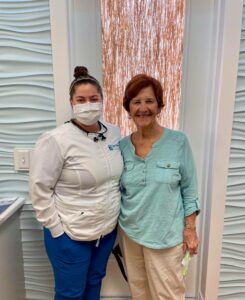Menopause is one more fun and exciting life change for many patients. (Sorry, did that sound sarcastic?) While most of us dread the idea of menopause after all those horror stories about hot flashes and mood swings, there are a few ways you can help your body out through the change. Menopause, along with all those other fun symptoms, can affect your oral health! Read on for some essentials on protecting your teeth later in life.
Menopause May Have Negative Effects on Oral Health
Almost 60% of menopausal people experience some level of oral discomfort. Dry mouth appears to be at the root of many of these problems. Decreased saliva can make it difficult to eat and swallow. It can also increase risks for gum disease and decay, and cause other painful conditions including ulcers and sores, as well as jaw problems.
Menopause can also affect the integrity of your bone health. Osteoporosis can cause instability in the bony crests that support your teeth and create problems with the jaw joint as well. Even without an osteoporosis diagnosis, the hormonal changes during menopause can leave you at higher risk for bone loss and periodontal problems. That means more shifting teeth, and possibly losing some teeth as well.
For those patients who do develop osteoporosis, the medications for treating the disorder bring their own oral health concerns. If you are taking, or have ever taken, bisphosphonates such as Boniva or Foxamax, be sure to always let your dental team know before any procedures. These medications can cause serious complications with some dental procedures.
Not every patient going through menopause will experience serious oral health complications. Frequently, it just causes a lot of irritation. If you experience increased gum tenderness, dry mouth, or shifting teeth, let your dentist know so they can help keep you comfortable. Likewise, many menopausal people experience Burning Mouth Syndrome. While we still don’t fully understand why BMS happens, we do have plenty of secret weapons to alleviate much of the discomfort it causes.
Why Does Menopause Affect Oral Health?
So we know menopause can create oral health issues. But why? As you might guess, many of these problems come down to hormones. Loss of estrogen can cause a decrease in components that keep gums health. In turn, this leads to recession in the gums, as well as puffiness, sensitivity, and bleeding.
Shifts in the balance of your hormones may also be to blame for decreased saliva and dry mouth. However, because menopause is often accompanied by other health changes such, dry mouth may have more to do with what medications you start taking around this time in life. For example, high blood pressure medications as well as many medications for depression and anxiety, among others, can lead to lack of saliva as well.
It may seem weird, but menopause is often accompanied by shifting teeth! Along with gum recession and loss of bone integrity, the support structures that keep your teeth in place may start to weaken. Estrogen also has a lot of impact on the strength of your ligaments, such as the ones that anchor your teeth in their sockets. As a result, your teeth may start to drift out of alignment. While this may seem like a primarily cosmetic concern, it’s anything but. Misaligned teeth can cause disharmony in your bite. That means more grinding, which can cause jaw pain and headaches. It can also put excess pressure on fewer teeth, leading to cracks, fractures, and even cause the nerve of that tooth to die.
What Can You Do to Maintain Your Oral Health Through Menopause?
Is it all doom and gloom when it comes to menopause? No! There is plenty you can do to protect your oral health through menopause and into the glorious later stages of your life.
Keep Up with Your Oral Care Routine
First and foremost, keep up with regular dental care. The more regularly your dental team sees you, the quicker we can catch those changes and prevent problems before they start. Often times, your dentist or hygienist may let you know you’re showing signs of dry mouth before you even realize it!
Talk to Your Medical Doctor
As you approach menopause, consider talking to your doctor about hormone replacement therapy. For many patients, HRT can prevent and alleviate many of the discomforts and health problems associated with menopause. Although there is a scarcity of data when it comes to the impact of HRT on oral health, there is some evidence to suggest that replacement hormones may help improve oral health outcomes during menopause.
Managing Dry Mouth
If you are experiencing dry mouth, be sure to stay hydrated and avoid caffeine, tobacco, and alcohol where possible. We can also recommend some great over-the-counter products to help maintain healthy moisture in your mouth and prevent problems like decay and sores. Not that we lack humidity here in Florida, but some patients find sleeping with a humidifier in their room can help keep dry mouth at bay while they sleep.
Relief for Burning Mouth Symptoms
If you develop symptoms of Burning Mouth Syndrome, we can help! We’ve got plenty of tricks up our sleeve for helping to alleviate those unpleasant sensations. However, you can also help by avoiding triggers like spicy and acidic foods, as well as abrasive and whitening toothpastes.
We’re Here to Help You Stay Healthy!
In general, be sure to maintain a healthy diet and consider calcium and vitamin D supplements to help protect your bone health and protect your jaw. And of course, keep up with great brushing and flossing habits!
As always, your dental team here at Lake Baldwin Dental is here to support you through every stage of your life! If you have any questions or concerns, do not hesitate to ask. We strive to be here for you through it all, menopause included! Keep smiling through all life’s changes, Orlando!


